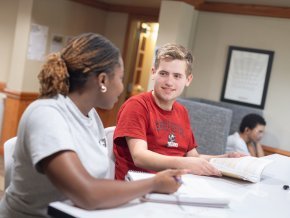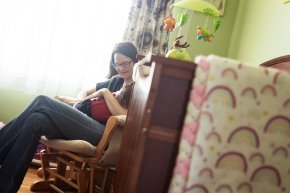
Foster Parenting 101

Balancing study sessions with diaper changes, in 2020 Stephanie Watts ’11, M.A. ’24, took on the challenges of graduate school alongside the challenges of foster parenting. Spring of 2024 brought new milestones for her career, vocation and family — she completed her master’s degree in human services at Lenoir-Rhyne, finalized the adoption of her first daughter and began the process to adopt a second child.
“I hadn’t originally planned to adopt two children, but they’re full biological sisters. Keeping them together was important because they’ll always have each other,” Watts explained while feeding the infant a bottle and watching her toddler play. “Circumstances and plans change. I think all foster parents will tell you, we go in with a set of ideals, what we feel like are our goals, and then it all changes because these little ones change your heart.”
A mom for a season
According to the Children’s Home Society of North Carolina, more than 5,000 children enter the state foster care system each year, a number that consistently outpaces the supply of foster homes available. By law, anyone 21 years of age or older can apply to become a foster parent.
“I think I was 28 when I started the process to become a licensed foster parent. I had a very close friend who had four children that I used to babysit. I remember talking to her about my plans,” Watts shared. “I told her when I turned 30, if I wasn’t married and was still free and able to do it, I’d like to foster. She said, ‘Why wait?’”
When she told her parents about her decision to foster they were surprised, and their response was a little skeptical at first.
“I had gotten a cat about two months earlier, so my dad said, ‘Can we just get you another cat?’” she chuckled. “It’s challenging work, so he thought there were easier ways to find companionship. Once they understood my reasons, my parents could not have been more supportive. They’ve been so active in these children’s lives, so giving with their time for childcare. I couldn’t have done any of this without them.”
Watts’ motivation for becoming a foster parent stemmed from her deep faith in God and her connection to her church. “We’re called as believers to serve our community,” she said.
She also found motivation in the roots of community service planted during her time as a student at Lenoir-Rhyne.
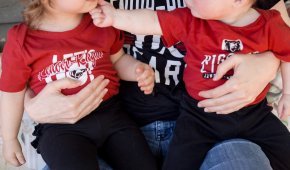
“We had service days every year, and even in our first week of orientation, we did service in the community,” Watts explained. “Then as a teaching fellow, one of our big components was servant leadership and what that looks like not only in your classroom as a teacher but also in your community. That was a major aspect of why I became a foster parent. I saw the need when I was teaching public school and realized that I had a home and the capacity to provide that opportunity for children who needed me.”
The process began with an information session with the Department of Social Services (DSS), where Watts discovered the leader of the session was a high school friend of her mother.
“Miss Audrey became my first case worker as a licensed foster parent, and that was really good to just have her on my side — someone that my mom respected and had a previous relationship with to help me through the first time,” Watts shared.
Since 2018, Watts has fostered six girls — all infants or toddlers — including the sisters she is adopting. All are visible in photos on the wall of her adopted daughter’s nursery. She keeps in touch with most of the families now raising the girls.
Children enter foster care because their families of origin are unable to meet their needs for many reasons. The ideal end goal is to have those children reunite with their families whenever possible. In North Carolina, around 30 percent of children in foster care have been reunited with their families since 2019.
“I think of fostering as standing in the gap,” Watts shared. “I read a book called ‘Sermon on the Mount’ by Sinclair Ferguson, and he talks about how being called to address social justice in your community is about speaking for those who have been sinned against and need that voice. It’s standing in the gap where they're not able to. That’s how I think about fostering. It’s for a season. I’m standing in the gap for these families until they can get the help they need and take the child back into their fold.”
A history of service
Watts lives in a house on the farm where she grew up in Iredell County, North Carolina, with her parents on the same property and neighbors and friends nearby. Watts and her siblings were raised with wide-open spaces for playing and exploring. Her daughters will have those same opportunities and the support of their new family and community.
“It’s a great place to grow up,” she shared.
After graduating from high school, Watts enrolled at Lenoir-Rhyne because she was drawn to the smaller class sizes.
“I’ve always done better with smaller, more personal classes,” Watts added. “My sister had gone off to NC State two years prior because she wanted the opposite, she wanted to blend in and be kind of anonymous. I wanted to feel more connected.”
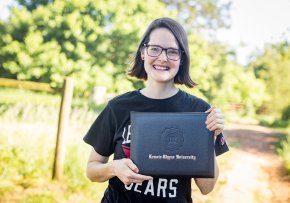
Another bonus for Watts came in the form of admission into the first cohort of the Teaching Scholars program, which provides four-year scholarships to incoming freshmen majoring in education. The program includes opportunities for academic growth, community involvement and public service as part of its requirements. Watts completed majors in elementary education and special education.
Her first job post-graduation was teaching special education in Alexander County, just north of Hickory. She remained in this position for three years before transitioning to early childhood education.
Later she would move on to the Iredell County branch of the North Carolina Cooperative Extension Office, a statewide service from North Carolina State University that connects community members to research-based best practices in the areas of agriculture, family-consumer science, and youth development.
During the COVID-19 pandemic, Iredell County introduced a different challenge to Watts, moving her from the Cooperative Extension to the Public Health Department.
“I was supposed to be there for two weeks doing data collection, then I was put into a leadership role when vaccine roll out started statewide, so my time there extended,” Watts shared. “I was reflecting last night on that move to the health department, and I feel like God was saying to me, ‘Oh, you want to learn more about humanity and service? I can teach you something.’”
A mother and a scholar
When the COVID-19 pandemic limited operations in
2020, the Cooperative Extension Service encouraged employees to use the extra hours to pursue professional development and educational opportunities. Her experience as a foster parent and teacher led Watts to return to her
alma mater to pursue her master’s degree in human services.
“As a foster parent and early childhood teacher, I found that a lot of people aren't very informed about systems — the school system, the public health system, the DSS system,” she said. “There are a lot of services in the community that people don’t know how to navigate, and families need someone to advocate for them. I liked that idea, but I needed the credentials to follow through. I decided human services was the way I wanted to go.”
Seeing that LR had an online graduate program in this area and learning about the tuition discount for alumni, Watts enrolled one day before the county transferred her from the extension service to the health department.
“The demand on my hours changed literally overnight, and graduate school became this epic journey,” she said, smiling.
As the pandemic worries eased, Watts accepted an offer to stay with the health department as the maternal health and family planning clerk.
“I did that for two years, and I learned a lot about healthcare disparity, disparities and lack of access. It was really eye-opening,” she remarked. “I did a couple of my research papers for my master’s program based around those topics.”
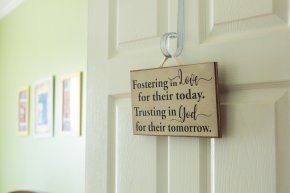
In addition to working and completing her degree, after 14 months without a foster placement, Watts took on three consecutive infant placements over 19 months.
“Two of them are the ones still here,” she said.
She had been fostering one of the girls when she got word that the child had a sister on the way. Wanting to give the children a chance to stay together, she opted to leave her job to focus on school and fostering.
“The baby was born the day after I turned in my resignation. It was the Lord’s timing,” Watts shared. “She was born at 30 weeks and needed a lot of care. The day after I finished my three-weeks notice, I was cleared to visit her in the hospital.”
The months since have been a series of legal proceedings to finish one adoption and begin another, finishing a degree and adjusting to being a mother to her two girls. Since completing her master’s, she is considering her next professional direction and how it will fit her new family.
“I'm still trying to take time to grasp what all this means for the long term because for so long I lived from season to season,” Watts shared. “I got a baby and said to myself, ‘She'll be here for a season, and we'll have a beginning and an end.’ But now, there’s just a beginning.”
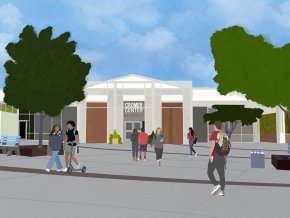
As higher education institutions grapple with declining enrollment LR is tackling the challenges head-on.
View More